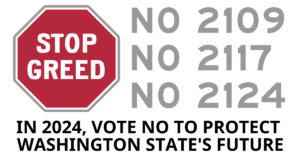In a email to supporters yesterday (copied to the media), Tim Eyman again extended his electronic tin can, asking supporters to make a contribution to his “Help Us Help Ourselves” compensation fund.
He also didn’t waste an opportunity to make a number of feel-good statements about his activities, presenting a phony view of reality.
So, therefore, we ask you to think carefully and consider the following:
Mr. Eyman claims that he and his supporters take on huge challenges every year. But how challenging is it to get an initiative on the ballot when you have one multimillionaire donor (Michael Dumire) who is willing to provide over $300,000 to pay signature gatherers for collecting signatures? Getting on the ballot is no challenge if you have deep pockets. A last look at PDC reports shows that Mr. Dunmire provided a whopping 76.5% of the funding for Eyman’s “signature drive”.
Eyman initiatives do not solve problems. They create problems or make them worse. Almost all have been designed to wreak havoc on government revenue without regard to any of the consequences. They result in budget crunches and cripple valuable local public services.
Initiative 900 does not and will not “end a 40 year prohibition against independent performance audits of state government.” The state legislature already did that with the passage of EHB 1064 earlier this year (the bill was signed into law by Governor Christine Gregoire). Eyman had absolutely nothing to do with the bill or its passage, either. State Democrats had previously passed such legislation, and with Democrats assuming control of the state Senate in 2005, the legislation finally made it through both houses.
Eyman also crowed about his involvement in 1998’s Initiative 200, which barred government sponsored remedies for minorities that have previously been the target of grave injustices. Mr. Eyman’s logic of “treating everyone the same” falls flat on its face, since everyone has not been treated the same in the past, and even today, not everyone is being treated the same.
Then it was on to Initiative 695. Initiative 695 was tossed out in court after it passed because it was found to be unconstitutional. The reason the state motor vehicle excise tax was subsequently repealed was because the Legislature and the Governor were afraid of another effort to take away funding. That plan didn’t work out too well, as Eyman came back with another initiative anyway
In the 1999-2001 biennium, the state MVET was to have been distributed in three main ways: 47% to state transportation, 29% to local transits, and 24% to local governments. This funding was lost after the Legislature repealed the state MVET.
In terms of local distribution for counties and cities across the state, about $496,904,767 (in 2004) was projected to be lost because of Initiative 695 by the state Department of Revenue. The state Department of Revenue predicted that overall, counting both transportation and local distribution, up to $1,700,000,000 in funding for public services and transportation was lost for the 2001-2003 biennium, statewide. The bottom line is that I-695 blew a huge hole into our state’s transportation funding that has never been fully repaired.
Initiative 747, which passed in 2001, hurt local governments and has led to budget shortfalls across Washington State. Some cities are considering disincorporation because they no longer have the revenues to continue offering their citizens public services. The state loss from I-747 for 2004 alone was projected to be $48,753,000. Local municipalities lost $148,415,000 in 2004 alone – revenues that would have otherwise paid for valuable public services.
Ron Sims’ candidacy for governor of Washington State did NOT fail because of Sims’ tax reform proposals. It failed because his opponent, Christine Gregoire, had more money, support from the state labor council, more endorsements, and statewide name recognition (she had already served two terms as Attorney General).
Eyman loves to take credit for things he had nothing to do with, make political predictions (for instance, that I-912 will be approved this November), and play the role of amateur political scientist.
Eyman also likes to claim that he’s “keeping the political establishment on the defensive” but this is coming from a guy whose last four initiatives (I-267, I-807, I-864, I-892) have all ended in failure.
But Eyman lives in an Orwellian world, so nothing that anybody else says ever seems to matter. It’s the “Ministry of Truth” all over again.


